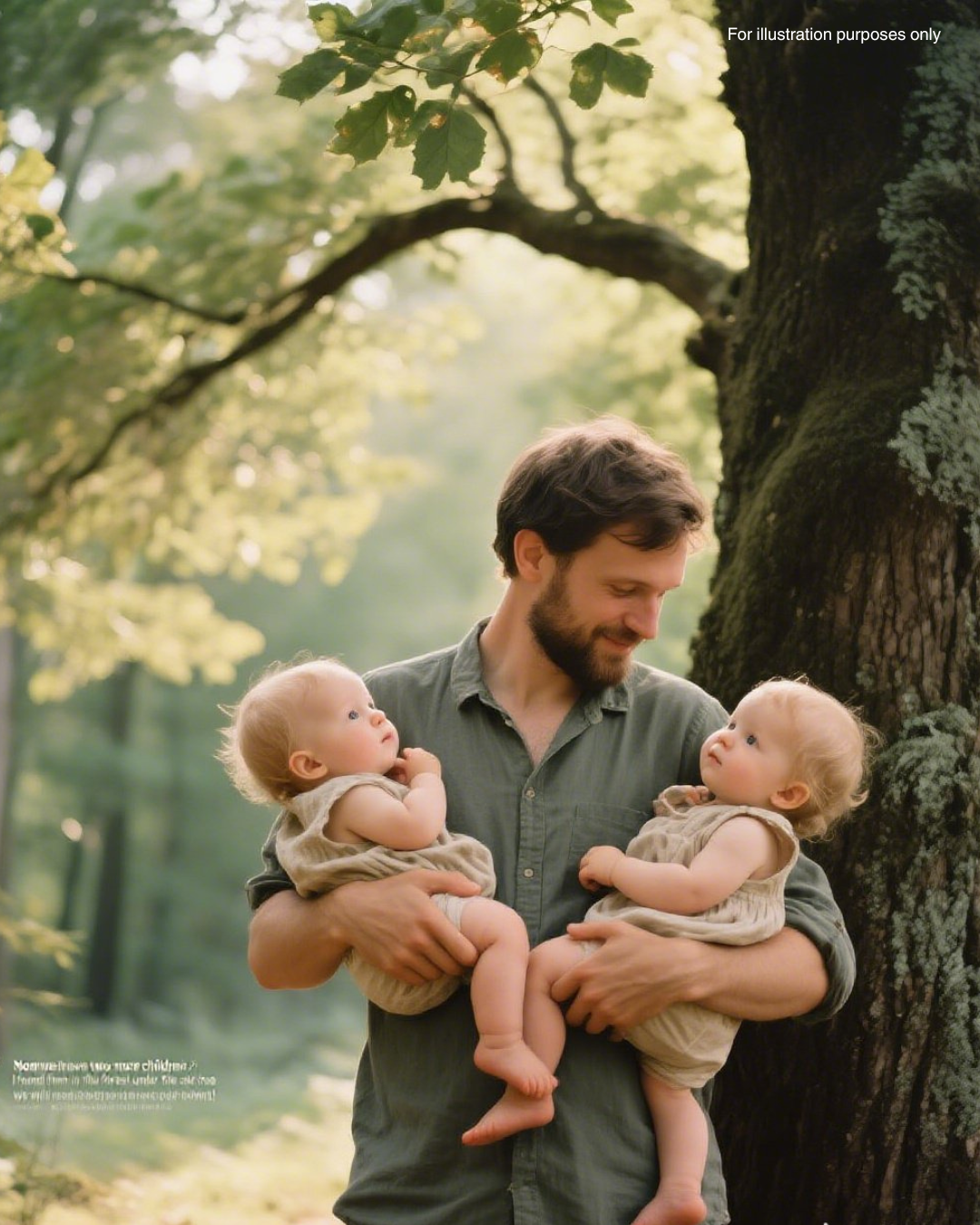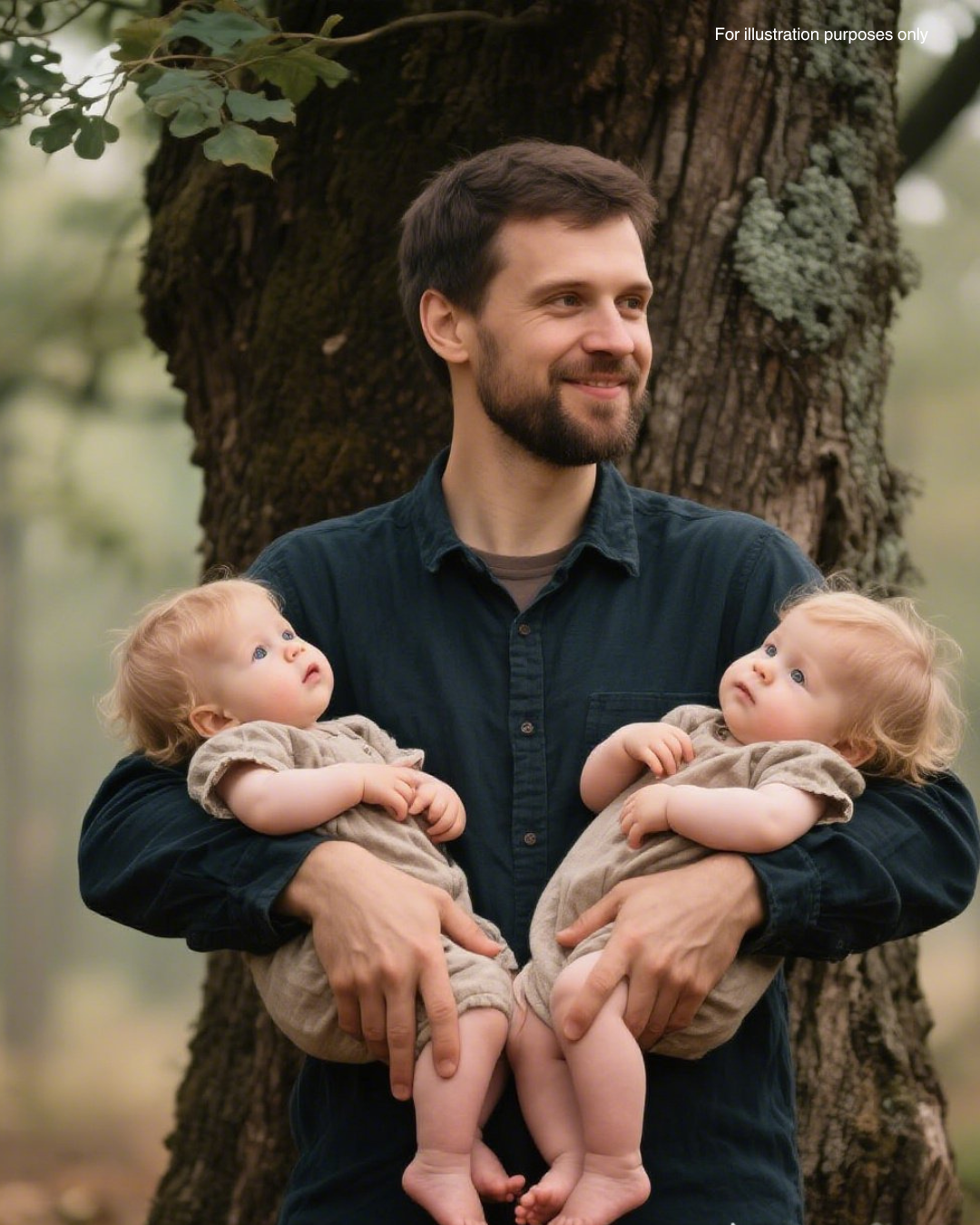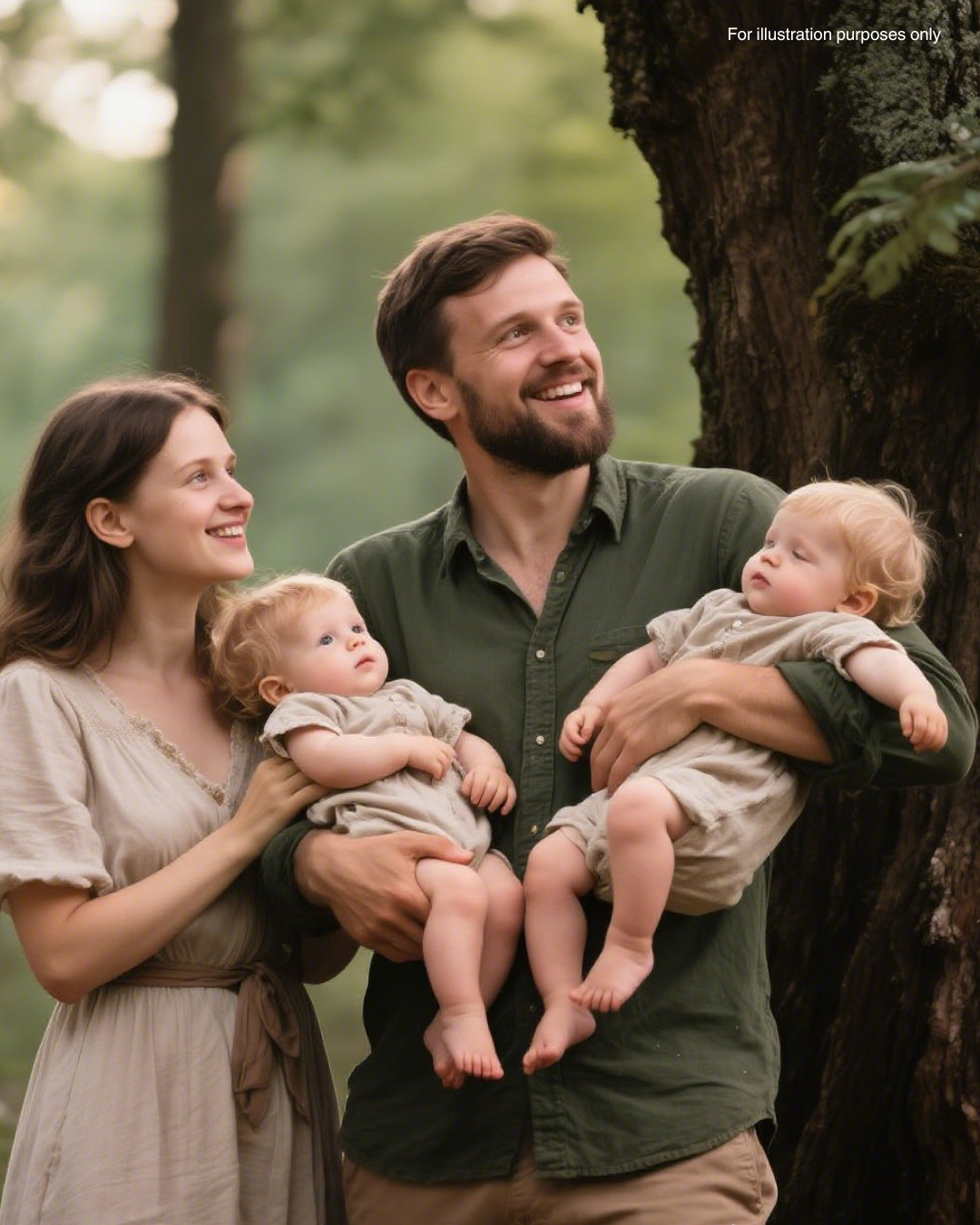Olga froze by the stove. Steam from the boiling water rose, fogging the window. Through the haze, she saw the silhouette of her husband carrying two bundles.
“What are you saying?” Olga slowly set the cup down on the table. “What children? Where from?”
The door flew open. Artem entered the kitchen—his hair tousled, wearing a jacket covered with pine needles. In his arms, he held two boys wrapped in his old woolen blanket. One tightly hugged a worn plush rabbit to his chest; the other seemed asleep. “They were sitting under the oak, as if waiting for someone,” Artem sank onto a chair, eyes fixed on the boys. “No one nearby, just adult footprints leading north, toward the swamp.”
Olga stepped closer. One of the boys opened his eyes—dark, clear. His forehead was hot, but his gaze was thoughtful.
“What have you done, Tyoma?” she whispered.
A rustle came from the bedroom. Varenka, their six-year-old daughter, appeared in the doorway, rubbing her sleepy eyes. “Mom?” She stopped, noticing the strangers. “Who are they?”
“They are…” Olga hesitated.
“They’re Timofey and Saveliy,” Artem said firmly. “They will live with us.”
Varenka approached, cautiously stretching her neck to examine the boys.
“Can I hug them?” she asked, raising her hand.
Olga just nodded, unable to utter a word.

The following days blurred into an endless chain of chores. The boys turned out to be younger than Varenka—around three or four years old.
They were afraid of loud noises, refused to eat meat. One was scared of the dark, the other hid behind the stove.
“We need to inform social services,” said Nina Stepanovna, the nurse who came to examine the children. “Maybe someone is looking for them.”
“No one’s looking for them,” Artem cut her off. “I followed their tracks. Do you know where they led? To the swamp. Understand?”
Nina pursed her lips.
“Rumors will spread, Tyoma. Why do you need extra mouths? You already have…” She glanced at Olga.
“Finish,” Olga’s voice was steel. “‘You already have’ what?”
“You don’t live by the sea,” Nina finished, looking away.
At night Olga stood by the window. Outside, the pine tops swayed, whispering secrets to each other. In the children’s room, three slept—Varenka hugged both boys as if protecting them.
“Not asleep?” Artem came up behind her, placing his hands on her shoulders.
“Remembering,” Olga said quietly.
She didn’t say what. Artem knew. Four years ago, when they first moved into this house on the edge of the forest, she lost a child—so quickly she didn’t even have time to be scared.
The doctor later said it was stress from moving. There were no more pregnancies.
“If you could pick them up,” Olga turned to her husband, “I have to keep them.”
Artem didn’t answer. His gaze was fixed somewhere toward the forest, dark and dense beyond the window. There, under the huge oak, a new story of their family began.
Within a week, the boys stopped hiding. Timofey, the one with the rabbit, showed Varenka how to make little sand cakes. Saveliy gently petted the neighbor’s dog who came by with a curious visit.
“They look like you,” the neighbor chuckled, looking at the children. “Especially this one, with the dimple on his chin. Like he’s your own.”
Artem remained silent. In the evening, for the first time, he sat next to the boys and began telling a story about a bear and a fox. Olga watched from behind the door—his voice was calm, like the murmur of a forest stream.
There were now three children in their home. More noise, more fuss and care. But also more life—the very kind that never stops flowing, even when it seems everything has ended.
Six years flew by like a single breath. Autumn once again painted the forest in copper and gold tones. The house was overgrown with climbing hops; near the bathhouse, a sea buckthorn patch grew green.
Varya stood by the stove, her hair tied in a tight bun. At her age, she already knew how to cook cabbage soup and fold laundry into neat stacks.
“They’re teasing again,” Timofey threw his backpack onto the bench. “They say we’re not real.”
“Did you punch them?” Varya turned to her younger brother.
“Savka did,” Timofey smiled. “Then he sat under the tree until evening.”
Artem entered the kitchen, shaking raindrops from his jacket. Over the years, his shoulders had broadened, and silver streaks appeared in his beard. “Saveliy got into a fight again?” he asked, pouring himself some fruit drink.
“He beat up Sanya Volkov,” Timofey nodded. “He said we don’t have a last name.”
Artem was silent. Every morning he drove the children in the old car five kilometers through the forest to school.
In winter, they often got stuck in snowdrifts, pushing the car out together, laughing when it finally broke free. In spring, they sank in mud; in autumn, fought with the rain.
“School hardens you,” he finally said. “Like iron in fire.”
“I’m tired of watching him being hardened,” Olga appeared in the doorway. Over the years, she had become thinner but stronger—like a forest vine. “That’s not hardening, that’s bullying.”
Saveliy came last—he sat quietly at the table, folding his hands. His knuckles were bruised.
“I won’t do it anymore,” he said without looking up.
“You will,” Artem put his hand on his head. “If they hurt you—you defend yourself.”
In the evening, Artem took the children to the forest. Under the drizzling rain, they walked mossy paths he knew like the back of his hand.
“Look,” he pointed to a tree cross-section. “See the rings? Each year—one ring. Outside is the bark; it protects. Without it, the tree will die.”
“Am I bark?” Saveliy asked.
“We’re all bark,” Artem nodded. “And roots too. They’re underground, unseen, but they hold everything together.”
At home, Olga combed Varya’s hair. The girl winced as the comb caught knots. “Mom, did you love them right away?” she suddenly asked.
“Who?” Olga froze.

“Timka and Savka. When Dad brought them.”
Olga put down the comb and sat opposite her daughter. Varya’s eyes, gray like her father’s, looked serious.
“No,” she answered honestly. “At first, it was scary. Then—worry. Then I realized they were always ours. Just born somewhere else.”
Varya hugged her mother, burying her nose in her shoulder.
“I was scared at first too, that they’d take you and Dad away from me. But now I can’t imagine life without them.”
At school, the children had different destinies. Varya was the top student, the teachers’ pride.
Timofey was a dreamer, a sketch artist, always somewhere in his own world. Saveliy was quiet, skilled with his hands, a master at fixing everything—from birdhouses to school desks.
“You have an unusual family,” a teacher once told Olga. “But strong. It shows.”
“The forest teaches,” Olga replied.
One morning Artem took the children to a clearing. There stood a structure made of branches and logs—something between a hut and a treehouse.
“This is where we’ll learn,” he said. “The forest isn’t a secret, it’s a mirror.”
They spent every weekend there. Learning to listen to birds, read tracks on damp earth, understand the wind’s scents. Varya drew a map of the forest, Timofey crafted a bow, Saveliy kept an observation diary.
“We’ll have a day of silence,” Artem once suggested. “A whole day without words—only gestures and glances.”
That day became a family tradition—the last Sunday of every month.
They learned to understand each other without words—by hand movements, head tilts, the wrinkle between the eyebrows.
At the end of the school year, the children brought drawings home. One showed a large family under a tree, all five holding hands. Another showed the forest with sun rays breaking through. Below was written: “Our home.”
The boys and Varya turned fourteen. Autumn again colored the forest copper and gold, scattering fallen leaves along the paths.
“What’s this?” Olga pulled an old wooden box from the attic chest. Dust rose into the air, making her sneeze.
Inside she found a faded photo. Artem, young and clean-shaven, stood next to another man about his age. They smiled, raising mugs. On the back, faded ink read: “Sanya. Summer on Olkhova.”
That evening the postman brought a letter. Olga didn’t immediately notice the return address, but when she saw it—she froze. The sender’s last name seemed vaguely familiar.
“Artem,” she called to her husband, chopping wood in the yard. “You’ve got a letter. From Marina Petrovna Kalinina.”
Artem’s face twitched. He took the envelope but didn’t open it—put it on the table and returned to the woodpile. Only at night, after the children had fallen asleep, did he sit by candlelight and tear open the edge of the envelope. Olga watched him, not daring to approach. She saw his shoulders tense, how he slowly lowered his head.
“What is it?” she finally asked.
Artem handed her a sheet:
“Artem, my son has gone to the Heavenly Beyond. He couldn’t tell you himself back then… His heart weakened, but his shame was stronger than words. The children are his. Their mother left even earlier. No relatives remain, I am ill and can’t care for myself. He knew you would give them life. Forgive me for writing only now. I needed time to accept it myself. Marina.”
Artem’s hand trembled as he put the letter down.
“Sanya,” he whispered. “Alexander Kalinin. We worked together at the reserve, then he left. I thought forever.”
“He… is the father of Timofey and Saveliy?” Olga sat beside him, putting her hand on his shoulder.
“Looks like it.”
They didn’t notice the floorboard creak in the hallway. Varya stood there, hand pressed to her lips. Behind her—two identical silhouettes: Timofey and Saveliy, tousled from sleep.
“So we had a father before you?” Timofey asked, stepping into the light.
Artem raised his eyes. There was no fear or confusion—only fatigue and some new wisdom.
“You had someone who loved you,” he replied. “But you’re mine. From that very oak.”
Saveliy came to the table, took the photo Olga had pulled from the box earlier. “Is this him?”
“Yes,” Artem nodded. “Alexander. Sanya. My friend.”

“I have his eyes,” Saveliy looked at the picture. “And Timka has his hands.”
Varya hugged her brothers’ shoulders.
“That doesn’t change anything,” she said firmly. “We’re still family.”
In the morning Artem took an old frame from the shelf. It held their family photo by the stove. Varya laughed, showing a chipped front tooth. The boys smiled—for the first time, truly. Artem and Olga stood behind, holding hands.
“Let’s hang it here,” Artem fixed the frame on the living room wall. “And this one too.” He took the photo with Sanya and hung it nearby.
“So they know their roots,” Olga nodded.
On the weekend, the whole family went to the forest. Sunlight filtered through thinning crowns, casting patches of light on moss and fallen leaves.
Artem led them down untrodden paths until they reached a clearing. In the center stood a huge oak—the very one where the boys had been found. The tree had changed—the trunk was thicker, moss covered the bark, one lower branch had dried and broken off.
“It all began here,” Artem stroked the rough trunk. “Now it’s your turn to continue.”
He pulled several maple seedlings from his backpack.
“We’ll plant them nearby,” he said. “Let them grow with you.”
They dug holes, gently lowered the saplings, tamped the earth around. Everyone’s hands were in the soil, their faces flushed from work.
“Let it grow as we grew,” Varya said, watering the last seedling.
In the evening, when the children had fallen asleep, Artem and Olga sat on the porch. Far beyond the forest, village lights twinkled. A cool breeze stirred leaves on the birch tree near the house.
“You never told me about him,” Olga laid her head on her husband’s shoulder. “About Sanya.”
“It hurt,” Artem admitted. “He left suddenly, without saying goodbye, and we were close friends. He returned to the city, got married. Then—silence.”
“But he remembered you in the end.”
“Yes. He knew I wouldn’t abandon his children.”
Artem looked at the star-filled night sky. Somewhere deep in the forest, an owl hooted, answered by another.
“You know what’s most important?” He turned to his wife. “I don’t regret it. Not one day regretted finding them under that oak.”
“Me neither,” Olga squeezed his hand. “We all found each other. The forest just brought us together.”
In their house on the forest edge slept three children. A stubborn little girl and two boys once left under the oak.
Now they were more than just a family. They were part of a bigger story that began long before them and would continue, growing like trees—slowly, inevitably, their roots digging deep into the earth.
